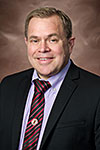UHV lecture to discuss U.S. violations of international law
The tactics used by the U.S. to fight the global war on terrorism during the past 12 years have brought up questions about the country’s violation of international law.

|
| Brad Roth |
“Because the attacks on Sept. 11, 2001, failed to match the existing legal frameworks of crime versus an act of war, government lawyers embrace the claim that this is a war, and yet it is a war unlike all other wars,” said Brad Roth, a professor of political science and law at Wayne State University in Detroit.
On Feb. 13, Roth will discuss the U.S. involvement in the global war on terrorism as part of the University of Houston-Victoria Provost’s Lecture Series. “Torture, Indefinite Detention and Targeted Killings: How the War on Terrorism Violates International Law” will start at noon in the Alcorn Auditorium, 3007 N. Ben Wilson St. The event is free and open to the public.
The global war on terrorism is a new type of war because it is an armed conflict fought in various countries against nonstate actors, mainly Al Qaeda, Roth said. His research has found three main issues with the way the U.S. has handled the war – the rules of engagement, terms for detention and treatment of detainees.
“This approach to the war has been catastrophic for the rule of law,” he said. “At its notorious worst, it led to the authorization of enhanced interrogation techniques, such as waterboarding, that clearly violated legal standards.”
By claiming the war is an armed conflict, the U.S. has been able to preventatively detain people who are potential threats, attack those thought to be the enemy and use extreme interrogation tactics to get information out of detainees, he said. Roth thinks that the government has gone too far.
“Some actions by lawyers of both administrations are not really respectable for reasons I’ll discuss at the lecture,” he said. “Their actions are living down to what people imagine is the worst about lawyers – finding a way to read the language in a way that contradicts the purpose of the documents they’re reading. They aren’t supposed to do that.”
Roth teaches international law, human rights, political theory and legal studies. He is the author of “Governmental Illegitimacy in International Law” and “Sovereign Equality and Moral Disagreement.” Roth also won the 1999 Certificate of Merit from the American Society of International Law as Best Work in a Specialized Area.

|
| Gino Tozzi |
He is a visiting scholar at the University of California, Berkeley’s Center for the Study of Law and Society, where he is researching tensions between international criminal justice and state sovereignty.
Gino Tozzi, a political science lecturer in the UHV School of Arts & Sciences, said the topic is important for South Texans because of the geographic relation to the Mexico border.
“People in the Crossroads need to understand international laws because we live so close to an international border, which is linked to our economy,” he said. “It is important for citizens to be informed about the government’s actions in regards to international law because it affects our rights, especially to privacy.”
Tozzi, who earned his master’s and doctorate from Wayne State University and is Roth’s friend, said he looks forward to hearing about Roth’s research into international laws.
“I am interested to see what questions the audience asks and the conversation that spurs from that,” he said. “Public opinion drives our politics. It’s important to ask questions and express our opinions because society can’t expect the government to give us all the answers.”

|
| Jeffrey Cass |
The Provost’s Lecture Series began as part of the university’s 40th anniversary celebration as a way to bring more opportunities for scholarly discussion to UHV. Previous lectures included discussions about civil rights leader Casey Hayden, life and politics in South Africa, and Texas before the Alamo.
“In the year since we started the series, we’ve had a wide array of topics,” said Jeffrey Cass, UHV provost and vice president for academic affairs. “The global war on terrorism is another timely topic for the Provost’s Lecture Series. I hope Dr. Roth’s visit will generate scholarly debate among university and community members.”
Roth said he doesn’t want people to be discouraged by complicated legal questions about the global war on terrorism.
“There are lines that should not be crossed, particularly in respect to people not being covered by humanitarian law,” he said. “Politicians are more afraid that voters will retaliate against them for not being tough than they are about voters retaliating for violating the rights of people with whom ordinary Americans don’t identify.”
The University of Houston-Victoria, located in the heart of the Coastal Bend region since 1973 in Victoria, Texas, offers courses leading to more than 80 academic programs in the schools of Arts & Sciences; Business Administration; and Education, Health Professions & Human Development. UHV provides face-to-face classes at its Victoria campus, as well as an instructional site in Katy, Texas, and online classes that students can take from anywhere. UHV supports the American Association of State Colleges and Universities Opportunities for All initiative to increase awareness about state colleges and universities and the important role they have in providing a high-quality and accessible education to an increasingly diverse student population, as well as contributing to regional and state economic development.
Katy Walterscheidt 361-570-4342






